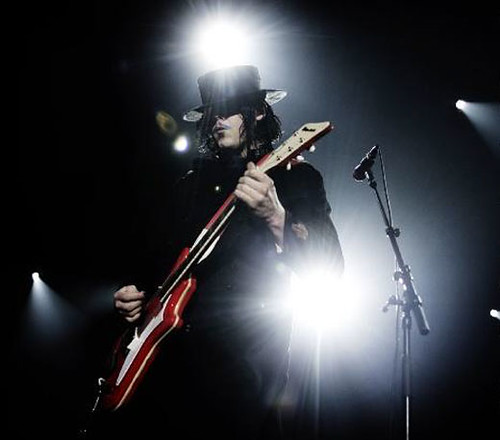
Jack White is a man of prodigious talent. He is a uniquely gifted songwriter, an amazingly skilled guitarist and, as was recently discovered, a kick-ass drummer. In his many bands, particularly the White Stripes, White manages to craft simple, catchy, quirky and deeply personal songs that continually succeed in an increasingly fractured music world. He is easily the greatest and most universally respected rock star to come down the pipeline in over a decade.
Looking beyond the wide range of the above-mentioned qualities, Mr. White's greatest gift is his impeccable good taste. His knowledge and admiration for the blues has served his songwriting well throughout his career, his unflinching devotion to analog equipment makes his recordings stand out amongst the glut, and most importantly his heroes are by and large visionary artists who pushed the envelope of their given field while maintaining a deep respect for the past. No man is more influential on the work of Jack White than Orson Welles.

The evidence is incontrovertible. The White Stripes song "The Union Forever", off of the album White Blood Cells, takes its entire lyric from lines from Welles's screenplay for Citizen Kane, co-written with Herman J. Mankiewicz (screw you Pauline Kael!).
White's record label and recently-opened Nashville record store are both called Third Man, after the Carol Reed masterpiece starring Welles as the enigmatic Harry Lime.

The song "Take, Take, Take" on the White Stripes album Get Behind Me Satan, details the fictitious encounter a star-struck fan has with actress Rita Hayworth, Welles's wife of five years in the 40's. About a year after the album's release, White married model Karen Elson, a redhead like Rita.

It is difficult to say which of the myriad qualities Welles possessed affected Jack White the most. Could it be Welles's ability to juggle multiple functions on any given project, sometimes being the writer, star, director, producer and editor, much like the multiple roles White puts upon himself in the music world? Or perhaps how Welles, post-the Magnificent Ambersons debacle, managed to work wonders within the confines of a limited budget and a dearth of materials? What about the way Welles seemed a man from a different era, displaced in his own time?
Personally I think the idea Jack White took most to heart from Orson Welles was his embellishment on his own past. The lies Welles made up about his upbringing, his artistic career and personal life, influenced White's public persona and the perception he feeds his audience. After his father passed away, an underage Welles travelled to Europe. One day he found himself outside the door to the Gate Theatre in Dublin. He weaseled himself into an acting gig there by telling the manager that he was a Broadway star. This lie opened the door for his subsequent career, starting with his acclaim on the stage, which led to his creation of the Mercury Theatre, which produced the legendary War of the Worlds broadcast and made Welles famous.
It is obvious that Jack White learned a lesson from this. From the outset Jack insisted that he and White Stripes drummer extraordinaire Meg were brother and sister, instead of a divorced couple. When the truth came to light sometime later, White ignored it, maintaining the illusion he had created. He knew that the idea of a two-piece rock band comprised of siblings made for much better copy than the truth. As with another hero, Bob Dylan, White acts as a man from a bygone era, a blues-man from the crossroads, a drifter and a loner, instead of a blue-collar carpenter from Detroit.
In perpetuating blatant falsehoods about who they were Orson Welles and Jack White managed to create much more than impeccable artistic bodies of work; they created themselves.











3 comments:
I'm sure you're all over this, but, here's something pretty great. Even without Jonathan Glazer directing bullets, this looks awesome. Sounds good, too.
That inspired me to buy the album.
That's dope.
By the bye, I was asked the other day what my rock 'n' roll supergroup would be and I came up with this little slice of perfection:
Guitar: Jack White
Bass: Mike Watt
Drums: Dale Crover
Vocals & Harmonica: Don Van Vliet a.k.a. Captain Beefheart
Recorded by Steve Albini. Playing songs written by that happy man pictured holding a guitar above me (that any New Jersey police officer would recognize.)
Post a Comment